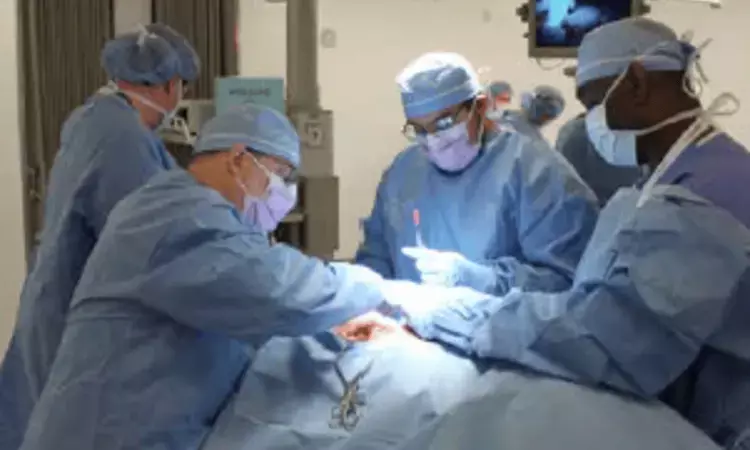- Home
- Medical news & Guidelines
- Anesthesiology
- Cardiology and CTVS
- Critical Care
- Dentistry
- Dermatology
- Diabetes and Endocrinology
- ENT
- Gastroenterology
- Medicine
- Nephrology
- Neurology
- Obstretics-Gynaecology
- Oncology
- Ophthalmology
- Orthopaedics
- Pediatrics-Neonatology
- Psychiatry
- Pulmonology
- Radiology
- Surgery
- Urology
- Laboratory Medicine
- Diet
- Nursing
- Paramedical
- Physiotherapy
- Health news
- Fact Check
- Bone Health Fact Check
- Brain Health Fact Check
- Cancer Related Fact Check
- Child Care Fact Check
- Dental and oral health fact check
- Diabetes and metabolic health fact check
- Diet and Nutrition Fact Check
- Eye and ENT Care Fact Check
- Fitness fact check
- Gut health fact check
- Heart health fact check
- Kidney health fact check
- Medical education fact check
- Men's health fact check
- Respiratory fact check
- Skin and hair care fact check
- Vaccine and Immunization fact check
- Women's health fact check
- AYUSH
- State News
- Andaman and Nicobar Islands
- Andhra Pradesh
- Arunachal Pradesh
- Assam
- Bihar
- Chandigarh
- Chattisgarh
- Dadra and Nagar Haveli
- Daman and Diu
- Delhi
- Goa
- Gujarat
- Haryana
- Himachal Pradesh
- Jammu & Kashmir
- Jharkhand
- Karnataka
- Kerala
- Ladakh
- Lakshadweep
- Madhya Pradesh
- Maharashtra
- Manipur
- Meghalaya
- Mizoram
- Nagaland
- Odisha
- Puducherry
- Punjab
- Rajasthan
- Sikkim
- Tamil Nadu
- Telangana
- Tripura
- Uttar Pradesh
- Uttrakhand
- West Bengal
- Medical Education
- Industry
Music therapy during surgery reduces anesthetic use and stress responses, reveals research

A new study published in Music and Medicine reveals that intraoperative music therapy significantly reduces the amount of propofol required during laparoscopic cholecystectomy performed under general anesthesia. This research demonstrates that intraoperative music therapy significantly reduces the amount of propofol required during laparoscopic cholecystectomy performed under general anesthesia. Patients who received therapeutic music required less anesthesia, experienced smoother awakenings, and showed reduced physiological stress markers, including lower perioperative cortisol levels. These findings highlight the potential of music as a powerful non-pharmacological tool in the operating room, demonstrating enhanced patient outcomes and reduced reliance on medication.
This study is available open access online to the public courtesy of Music and Medicine and IAMM (The International Association for Music and Medicine)
“These findings show that this is more than just simple background music, rather an integration of a novel intervention into anesthetic practice,” said Dr. Tanvi Goel, principal investigator and anesthesiologist at Lok Nayak Hospital and Maulana Azad Medical College in New Delhi, India.
“By delivering intraoperative music, we’re engaging the patient’s nervous system even under anesthesia—blunting the neuroendocrine stress response when the body is most vulnerable,” added Dr. Farah Husain, co-investigator and certified music therapist.
“The auditory environment under anesthesia is often neglected, but sound—when delivered with therapeutic intent—may accelerate healing, reduce stress, and improve recovery in ways we are only beginning to quantify,” noted Dr. Sonia Wadhawan, Director Professor of Anesthesia and Intensive Care at Maulana Azad Medical College.
Key findings of the study include:
- Reduced anesthetic needs: Patients in the music group required significantly less propofol and fentanyl.
- Smoother awakenings: Participants experienced gentler, more comfortable recovery from anesthesia.
- Lower stress response: Perioperative cortisol levels were substantially reduced compared with controls.
“This study adds to the growing empirical evidence that the neural effects of patient-preferred music translate to behavioral benefits,” said Wendy L. Magee, PhD, Professor of Music Therapy at Temple University’s Boyer College of Music and Dance. “For people with disorders of consciousness following brain injury, patient-preferred music improves arousal and cognition. This research furthers the evidence that music with personal meaning enhances salience and emotional impact-maximizing music’s neural effects and supporting recovery.”
“This study shows the real potential of music to improve anesthetic care, but we must go further,” said Joseph J. Schlesinger, MD, FCCM, Professor of Anesthesiology, Critical Care Medicine, Hearing & Speech Sciences, and Biomedical Engineering at Vanderbilt University Medical Center. “To truly understand how music affects the brain during surgery, we need multimodal EEG and a broader view of the perioperative sound environment that includes both patient outcomes and provider safety.”
“These findings open the door for future studies to expand sample sizes, explore music therapy across general anesthesia for different types of surgery, and develop standardized music protocols that could be implemented in hospitals worldwide.” Fred J Schwartz, MD Editorial Commentary from Music and Medicine-
Reference:
Dr. Tanvi Goel, Dr. Farah Husain, Dr. Sonia Wadhawan, Effect of patient selected music therapy on propofol consumption in laparoscopic cholecystectomy under total intravenous anaesthesia: A randomised controlled trial, Music and Medicine, DOI: https://doi.org/10.47513/mmd.v17i4.1111
Dr Kamal Kant Kohli-MBBS, DTCD- a chest specialist with more than 30 years of practice and a flair for writing clinical articles, Dr Kamal Kant Kohli joined Medical Dialogues as a Chief Editor of Medical News. Besides writing articles, as an editor, he proofreads and verifies all the medical content published on Medical Dialogues including those coming from journals, studies,medical conferences,guidelines etc. Email: drkohli@medicaldialogues.in. Contact no. 011-43720751


